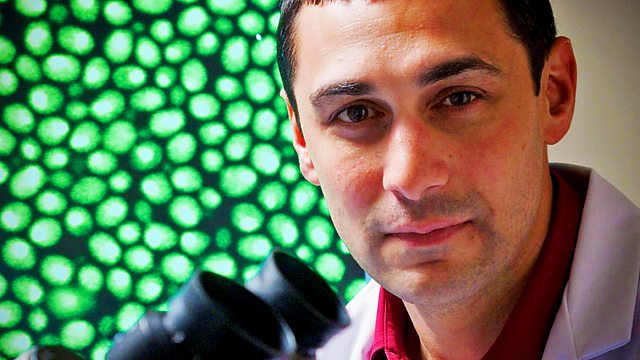Human Cultural Evolution Versus Genetic Evolution
Adam Rutherford asks how our ability to talk, travel and develop technology - our unique human culture - affects human genetic evolution.
Human uniqueness takes many forms: we can communicate complex ideas; we have developed technologies, such as medicine and transport; and we change our environment to suit our biology. But how does human culture affect our biology - our genes?
Geneticist and broadcaster Adam Rutherford explores the complex and sometimes controversial world of human evolution. He talks to geneticists, evolutionary psychologists and anthropologists to try and understand and untangle the relationship between our biology - our genes and our cultural and social behaviour.
Have we, as Professor Steve Jones thinks, evolved beyond evolution by natural selection? He thinks that in the western, developed world, the normal driving force for evolution by natural selection is tailing off. We are all having a similar number of babies and those children are surviving and having children of their own. The impact of this is that there's no longer an opportunity for genes which may be beneficial to be selectively passed on. As these trends increase, he says that "if we haven't already stopped evolving, we soon will."
Seeing evolution in action isn't easy, by its very nature, it only occurs on a generational time-scale. But there is evidence of very recent human evolution, some of which may still be occurring now. Since the Human Genome was decoded, geneticists are finding regions of genetic code which are relatively stable amongst populations - the so called "Darwin's Fingerprint" - evidence that these genes have been selected for and passed on, in the past. Examples of these include genes for lactose tolerance, which evolved in dairy herders, as recently as 3000 years ago, and is thought to still be spreading as the world switches to a dairy-rich diet. Disease-resistance is also seen in our genomes, as is apparent increases in the length of time women are able to have babies.
Probably the most important area of human evolution since we split from our last common ancestor with chimpanzees, is in the development of our brains. But there is very little evidence that our brains are still evolving - biologically. Being more intelligent does not mean that you will have more babies and pass your 'brainy' genes to more children.
Cognitive psychologist, Steven Pinker thinks that "just because our society is changing and our way of life is changing beyond recognition doesn't mean that our genes are changing as well."
But, Kevin Laland, at St Andrews University says we're not just passive actors in our genetic destiny. In fact it's our ability to change our environment which not only drives out cultural evolution, but has a direct effect on our genes as well.
Many recent examples of human evolution have happened in closed societies and are a result of pairing up within a limited gene pool. One example is the Ashkenazi Jews, who may have evolved increased intelligence, as well as a number of heritable diseases. With societies now starting to open up, and the increasing acceptance of interracial and cultural marriages; ease of travel; and increased connectivity through the internet etc. Adam Rutherford asks if we're heading for a much more homogenous society? And what will this mean for our genetic diversity and possible future evolution?
Producer: Fiona Roberts.
Last on
More episodes
Previous
You are at the first episode
Broadcasts
- Tue 16 Aug 2011 11:00大象传媒 Radio 4
- Thu 18 Aug 2011 21:00大象传媒 Radio 4

